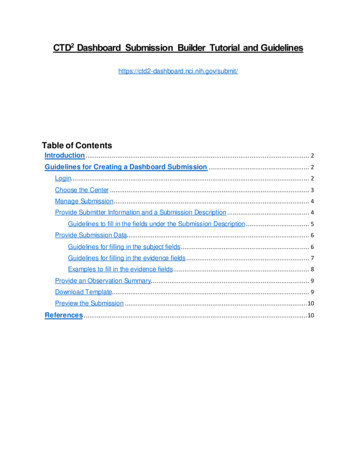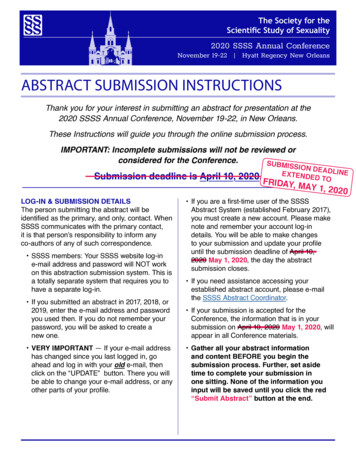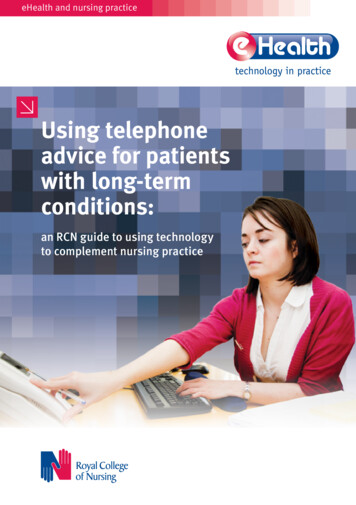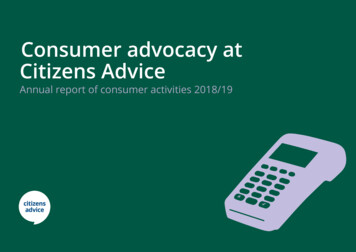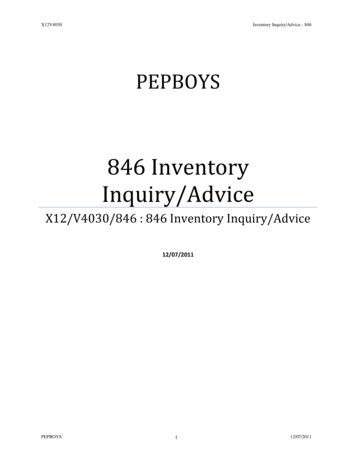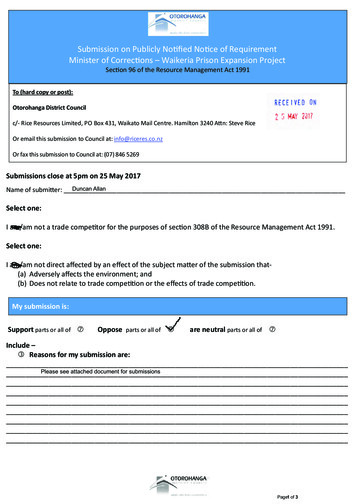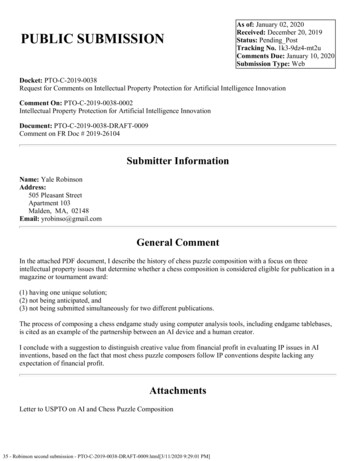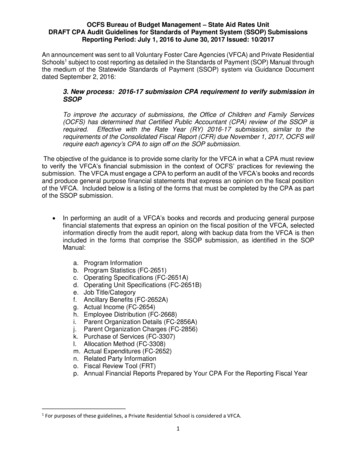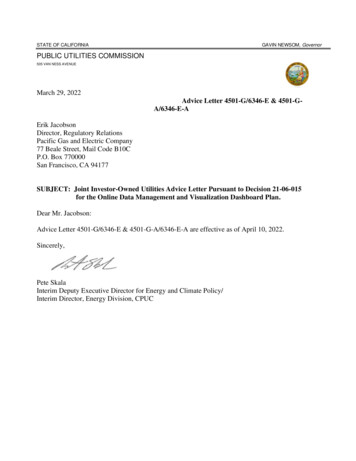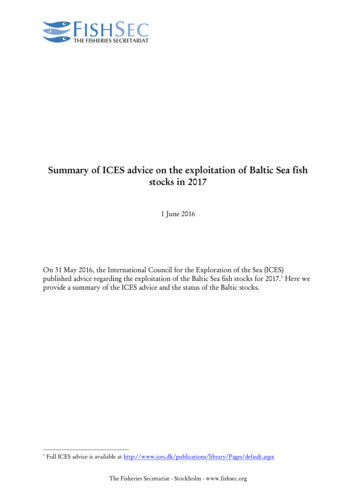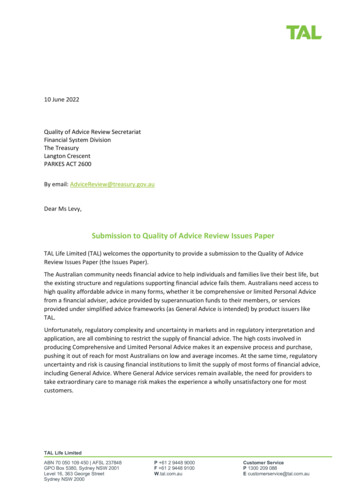
Transcription
10 June 2022Quality of Advice Review SecretariatFinancial System DivisionThe TreasuryLangton CrescentPARKES ACT 2600By email: AdviceReview@treasury.gov.auDear Ms Levy,Submission to Quality of Advice Review Issues PaperTAL Life Limited (TAL) welcomes the opportunity to provide a submission to the Quality of AdviceReview Issues Paper (the Issues Paper).The Australian community needs financial advice to help individuals and families live their best life, butthe existing structure and regulations supporting financial advice fails them. Australians need access tohigh quality affordable advice in many forms, whether it be comprehensive or limited Personal Advicefrom a financial adviser, advice provided by superannuation funds to their members, or servicesprovided under simplified advice frameworks (as General Advice is intended) by product issuers likeTAL.Unfortunately, regulatory complexity and uncertainty in markets and in regulatory interpretation andapplication, are all combining to restrict the supply of financial advice. The high costs involved inproducing Comprehensive and Limited Personal Advice makes it an expensive process and purchase,pushing it out of reach for most Australians on low and average incomes. At the same time, regulatoryuncertainty and risk is causing financial institutions to limit the supply of most forms of financial advice,including General Advice. Where General Advice services remain available, the need for providers totake extraordinary care to manage risk makes the experience a wholly unsatisfactory one for mostcustomers.TAL Life LimitedABN 70 050 109 450 AFSL 237848GPO Box 5380, Sydney NSW 2001Level 16, 363 George StreetSydney NSW 2000P 61 2 9448 9000F 61 2 9448 9100W.tal.com.auCustomer ServiceP 1300 209 088E customerservice@tal.com.au
An urgently needed reviewThe excessive regulatory complexity and uncertainty results in a very limited supply of financial advice,at exorbitant opportunity cost and monetary cost to customers. Change is urgently needed, and it is ourhope the Quality of Advice Review charts a bold way forward for quality, accessible and affordablefinancial advice in Australia.TAL supports the scope and goals of the Review. We believe focusing on the advice regulatoryframework through the lens of quality, affordability and accessibility will help policy makers address thechallenges besetting the sector, and damaging consumer outcomes. A balance must be struck betweenmaintaining the high standard of comprehensive Personal Advice some Australians currently receive onfinancial strategy and products, with reforms that make it easier for all Australians to receive affordableadvice, with choice as to what is covered by that advice and how it is delivered.The financial services sector has implemented reform and cultural change from the Royal Commissioninto Misconduct in the Banking, Superannuation and Financial Services Industry and that workcontinues. Simultaneously, the trend for customers to utilise online services to meet their needs acrossall aspects of consumption is accelerating. This trend is as present in financial services as it is in otherindustries, and is driving ever higher customer expectations as to what constitutes good service andexperience. In this context, the Review’s focus on how financial advice regulations facilitate digitaladvice that meets customer needs is important and timely.Key issues for examinationThe Quality of Advice Review is rightly broad in focus, and no aspect of financial advice should beignored. Consumers expect to have a choice in the type of financial advice they access, with eachchannel being capable of meeting customer need – be it via Comprehensive Advice, Limited Advice orGeneral Advice or any form of advice delivered digitally.TAL is a strong believer in, and supporter of, Comprehensive Personal Advice provided by financialadvisers. It is critical more consumers have the choice to access life insurance through a financialadviser, where their needs (including life insurance) can be appropriately assessed as part of acomprehensive financial plan. Accordingly, we look forward to the Review making recommendationsthat enabling consumer access to affordable, high quality financial advice, and supporting advisers to beable to supply this important service efficiently and professionally.Notwithstanding this, TAL has identified broader issues we believe are of particular importance toadvised and non-advised Australians alike. This is why we bring a particular focus to Limited Advice,General Advice, and digital advice in our submission. Improving access and affordability to these typesof advice will produce benefits to all participants in the advice process, including consumers, advisers,product issuers and distributors. These elements are summarised below and addressed in ourresponses to relevant questions from the Issues Paper.Key issue: reforms to make advice more responsive to customer need and improve accessTAL recommends the current advice regulatory framework be reformed to be more customer centricand to meet customer demands for quality, accessible and affordable advice. TAL believes this could beachieved by:1. Streamlining the delivery of Comprehensive Advice. Intended for customers wanting detailedstrategic advice or who have more complex needs, Comprehensive Advice is of vitalimportance. This is the service Australia’s highly trained financial advisers are best placed todeliver, but there are needs for regulatory reforms to enable lower cost production to make it2
more accessible. We comment on some of these in our submission, and more generally noteand support reform recommendations made by the Financial Services Council (FSC) and theAssociation of Financial Advisers (AFA).2. Redefining and adapting Limited Advice to provide advisers with better support toconfidently deliver it in a cost-effective manner, and therefore increase customer access to it.Including a clear definition in the legislation of Limited Advice and prescribing how it can bedelivered would make Limited Advice a more certain concept, aimed at customers requiringdetailed advice and support on narrower or single issues. The scope should be capable of beinglimited in both product category and in product range, while the types of AFSL representativespermitted to provide it should be enlarged. Supporting reforms addressing the economics oflimited advice production are also required to enable greater access to this type of advicethrough financial advisers and qualified AFSL representatives.3. Clarifying the purpose and scope of General Advice (re-termed as Product Guidance for thepurpose of this submission). This category of advice would permit product issuers anddistributers to better support self-directed customers than they are able to today. Providerswould be permitted to ask customers relevant questions, to provide guidance based oncustomer responses and to provide examples of choices that are relevant to the profile of thecustomer; ultimately, helping customers make more informed decisions.Simply, General Advice should work and benefit consumers, but it doesn’t. The extremeregulatory risk of stepping over the boundaries of General Advice, lead most natural providersto General Advice not to provide it all.The chart below illustrates how these types of financial advice fit into an advice system that we believewould better respond to customer needs.3
From a customer’s perspective, we believe this approach provides clearer pathways and access to thefinancial advice they need and want.Key issue: LIF and supporting consumer access to independent financial adviceAn important feature of the Review is its incorporation of the review of the Life Insurance Framework(LIF), and the question whether there is a continued role for commissions as a funding mechanism forlife insurance advice.As we make clear in our submission, TAL strongly believes consumers should have a choice in whetherthey pay an upfront fee for life insurance advice, or whether the fee is paid by the product issuer in theform of a commission. Because an upfront fee deters many people from seeking life insurance advice,our conclusion is commissions facilitate access to the benefits of life insurance advice, while the LIFinstrument acts to better align the interests of customers, advisers and life insurers. Consumers cancurrently choose between a fee or commission, and TAL supports consumers continuing to have thatchoice, and the continuation of LIF.With customer access to life insurance advice already under pressure, any reductions in LIF commissionrates will inevitably result in further material decreases to the accessibility of life insurance adviceprovided by financial advisers. This would have damaging consequences, undermining outcomes forindividuals while exacerbating Australia’s underinsurance challenge.Key issue: enhancing access to advice via superannuationA critical issue for the Review to also consider is the role of superannuation funds in delivering financialadvice. Superannuation funds are a trusted and logical avenue for Australians to seek advice onfinancial issues, particularly their superannuation settings, the insurance provided by theirsuperannuation fund, and their retirement options.In respect of retirement, the Retirement Income Covenant explicitly recognises the role superannuationfunds can play in assisting their members prepare for retirement. Retirement decisions are one of themost complex yet important financial decisions most Australians will ever make, so it is imperative the4
Review deeply consider how advice regulation facilitates superannuation funds confidently andsustainability stepping into this role.For superannuation funds to be able to appropriately meet the advice needs of their members, thereneeds to be policy and regulatory change that supports them in doing so. Superannuation funds facethe same difficulties with the General Advice and Personal Advice regulatory shortcomings as outlinedabove. There are also challenges with the limited scope of intra-fund advice, and TAL notes there is anopportunity for this type of advice to be made more useful for customers.About TALTAL is one of Australia’s leading life insurers. Together with our partners, we protect 4.5 millionAustralians against the risks of death, disability, and illness. In the TAL financial year 1 April 2021 to 31March 2022, we paid more than 2.7 billion in claims to 39,628 customers and their families. Weprovide life insurance cover in several different ways – through our partnerships with superannuationfunds, via financial advisers, and directly to customers through digital and other platforms.TAL is a part of the Japan based Dai-ichi Life Group. Starting with the Dai-ichi Life Insurance Company,which was established in 1902 as Japan’s first mutual insurance company, today the Dai-ichi Life Groupis one of the world’s largest life insurance groups. Dai-ichi Life Group is also one of the world’s leadingproviders of retirement income products.For further informationShould you have any questions regarding the information in this submission, or about TAL generally, wewould be pleased to assist. Please contact in the first instance Mr James Connors, Head of Corporateand Government Affairs, on 0484 083 208, or by email at james.connors@tal.com.au.Yours sincerely,Brett ClarkGroup CEO and Managing Director5
Submission to Quality of Advice Review Issues PaperTAL is pleased to respond to the following questions from the Quality of Advice Review Issues Paper1.What are the characteristics of quality advice for providers of advice?. 82.What are the characteristics of quality advice for consumers? . 83.Have previous regulatory changes improved the quality of advice (for example the best interestsduty and the safe harbour (see section 4.2))? . 108.How much is the cost of meeting the regulatory requirements a result of what the law requiresand how much is a result of the processes and requirements of an AFS licensee, superannuationtrustee, platform operator or ASIC?. 139.Which elements of meeting the regulatory requirements contribute most to costs? . 1411. Could financial technology (fintech) reduce the cost of providing advice? . 1512. Are there regulatory impediments to adopting technological solutions to assist in providingadvice?. 1614. In what circumstances do people need financial advice but might not be seeking it? . 1615. What are the barriers to people who need or want financial advice accessing it? . 1816. How could advice be more accessible? . 1917. Are there circumstances in which advice or certain types of advice could be provided other than bya financial adviser and, if so, what? . 2122. What types of financial advice should be regulated and to what extent? . 2127. How does applying and considering the distinction between general and Personal Advice add tothe cost of providing advice? . 2628. Should the scope of intra-fund advice be expanded? If so, in what way?. 2730. Are any other changes to the regulatory framework necessary to assist superannuation trustees toprovide intra-fund advice or to more actively engage with their members particularly in relation toretirement issues? . 2932. Do you think that limited scope advice can be valuable for consumers? . 2933. What legislative changes are necessary to facilitate the delivery of limited personal scopeadvice?. 3035. Do you agree that digital advice can make financial advice more accessible and affordable? . 3236. Are there any types of advice that might be better suited to digital advice than other types ofadvice, for example limited scope advice about specific topics? . 3340. Are any changes to the regulatory framework necessary to facilitate digital advice? . 336
Submission to Quality of Advice Review Issues Paper42. In what ways can digital advice complement human-provided advice and when should it be asubstitute? . 3648. To what extent has the ban on conflicted remuneration assisted in aligning adviser and consumerinterests? . 3749. Has the ban contributed towards improving the quality of advice?. 3850. Has the ban affected other outcomes in the financial advice industry, such as the profitability ofadvice firms, the structure of advice firms and the cost of providing advice? . 3951. What would be the implications for consumers if the exemptions from the ban on conflictedremuneration were removed, including on the quality of financial advice and the affordability andaccessibility of advice? Please indicate which exemption you are referring to in providing yourfeedback. . 4153. Has the capping of life insurance commissions led to a reduction in the level of insurance coverageor contributed to underinsurance? If so, please provide data to support this claim. . 4255. What other countervailing factors should the Review have regard to when deciding whether aparticular exemption from the ban on conflicted remuneration should be retained? . 4565. To what extent can the content requirements for SOAs and ROAs be streamlined, simplified ormade more principles-based to reduce compliance costs while still ensuring that consumers have theinformation they need to make an informed decision? . 4668. Are there particular types of advice that are better suited to reduced disclosure documents? Ifso, why? . 467
Submission to Quality of Advice Review Issues Paper1.What are the characteristics of quality advice for providers of advice?Quality advice is advice that meets customer needs, while also being compliant with the adviceprovider’s regulatory obligations and is cost effective to deliver.The current legislative and regulatory environment has made the provision of advice in any form verychallenging.Financial Advisers are being forced to demonstrate their compliance with various laws and professionalstandards, including the best interest obligation, through lengthy Statements of Advice (SOAs). Theprescriptive steps set out in the best interest ‘safe harbour’ means advisers feel the need todemonstrate evidence of compliance to all steps in the SOA, while the final ‘any other step which wouldbe reasonably be regarded in the client’s best interest’, creates uncertainty and removes the ‘safe’ from‘safe harbour’, effectively negating the protection the provision is designed to provide. This complianceis making the provision of quality Personal Advice increasingly expensive resulting in the benefits offinancial advice being out of reach for many Australians.The complexity and uncertaintyimposed by the blurred line betweenPersonal Advice and General Advice isalso creating poor customerexperiences. The current PersonalAdvice/General Advice legislativeframework, including the recentguidance by the High Court 1,significantly restricts the ability orwillingness of General Adviceproviders to assist customers in a wayeither the customer or providerwould prefer (see Case Study 1).Case study 1: good help is hard to findprovideCustomers shopping for insurance with TAL often starttheir journey using digital services and tools providedunder General Advice. As they learn more about theproduct and move toward making a purchasing decision,customers often move between digital and humandelivered channels.At various points in the process, the customer may want toask questions, receive assurance on their approach, or seekvalidation of their decisions on product features.For example, a customer may call wanting to check theFor fear of straying into Personallevel of cover they have selected fits their need. CustomersAdvice, General Advice providers arequite reasonably expect TAL to be able to give thisforced into stilted, information-onlyassistance, and we would like to meet this expectation.conversations that frustrate theUnfortunately, the risk of straying into Personal Advicecustomer’s experience, that lead towhen answering these questions means our staff arepoor customer outcomes. The effectsunable to directly answer. Instead they are restricted toof recent changes to anti-hawkinghighly scripted conversations that may leave customerslaws (which now extend beyondfeeling unsure about their decisions.outbound telephone calls to alsoapply to inbound calls) also inhibitnatural conversations with customers, as explained in our response to question 3.2.What are the characteristics of quality advice for consumers?For customers, quality advice, regardless of its type or delivery mechanism, should be accessible, easilyunderstood, simple to follow and helpful to a customer. It should be fit for purpose, taking intoWestpac Securities Administration Ltd v Australian Securities and Investments Commission [2021] HCA 3, Date of Judgment: 3February 2021, S69/2020.18
Submission to Quality of Advice Review Issues Paperconsideration a customer’s wants andneeds, while being relevant to theircircumstances. Importantly, qualityadvice needs to balance outcomesagainst cost, and ultimately customeraffordability.The current Personal Advice/GeneralAdvice legislative frameworkobstructs customers from obtainingwhat they want, which detracts fromquality. TAL sees this in several ways: Personal Advice clientsfrequently only seek LimitedPersonal Advice, covering just asingle aspect of their financialcircumstances. Because thecurrent regulatory frameworkleads advisers towards broaderinquiries and scope, customersmust either accept moreexpensive comprehensivePersonal Advice (that is safer butmore costly for the PersonalAdvice provider to provide), orto forgo Personal Advicealtogether.Case study 2: effect of regulatory settings onconsumer outcomesAs a result of APRA’s intervention in the Australianindividual disability income insurance market, a newgeneration of more sustainable and therefore moreaffordable products have been launched.As at the date of writing, up to 50% of all productrecommendations made by advisers are for products withmore generous benefits for largely low probability personaldisability related events. As would be expected, the extrabenefits involve a higher premium cost.Research undertaken by TAL in March 2022 compared theproducts with generous terms with less fully featuredproduct designs, finding: the more generous product features provide greaterbenefit outcomes for just two out of 1000 customers onaverage the generous product features represent a total overallcost in excess of 48% of the cost of less fully featuredproducts.As an example, the cumulative lifetime cost for a 47 yearold, male non-smoker client, to acquire a less generous IDIIproduct was 68,787 versus the average cost of the moregenerous products of 132,938. Advisers sometimes feelregulatory pressure toDespite this significant cost difference, which would onlyrecommend financial productsresult in better outcomes in a very small minority ofthat are feature rich, even wherecustomers, advisers still feel that the way the best interestthere may be more cost effectiveduty will be interpreted by AFCA and ASIC requires them toand sustainable optionsopt for the most generous benefits regardless of the higheravailable. See Case Study 2 forcost.an example. In the currenteconomic environment of high inflation and increasing interest rates, price and value for moneymay be key considerations for customers and further regulatory guidance which gives adviserscomfort to recommend less costly, feature rich products and still meet their best interestobligations would be welcomed. We regularly help customers using tools and services provided under General Advice tounderstand and compare their product options. However, at various points in the process, thecustomer may want to receive assurance on their approach, or validation of their decisions 2. Thecurrent regulatory framework, including the recent guidance by the High Court 3, has made moreFor example, consumers in other markets are used to, and feel comfortable with, ‘people like you’ examples where providersreference products and services considered by people in similar circumstances. If General Advice providers were permitted toutilise similar examples customer experience and understanding would be improved, and confidence in outcomes boosted.Presently usage is not widespread due to ASIC expressing a negative view of ‘social proofing’ tools, including in its application tothe High Court (see following footnote). This is stifling innovation for consumers.3Westpac Securities Administration Ltd v Australian Securities and Investments Commission [2021] HCA 3, Date of Judgment: 3February 2021, S69/2020.29
Submission to Quality of Advice Review Issues Paperdifficult to provide this sort of assistance due to uncertainty on the divide between the statutorydefinitions of General Advice and Personal Advice.Apart from producing a good financial outcome for customers, quality advice also results in people whoare more satisfied with their life circumstances and confident about their futures. While less tangiblethan the financial outcome, this sense of security and wellbeing that advice can provide is nonethelessan important marker of a quality advice system.3. Have previous regulatory changes improved the quality of advice (forexample the best interests duty and the safe harbour (see section 4.2))?The safe harbour provisions have led to advice clients being presented with disclosure documents that,instead of being proportionate to the clients’ needs and the advice provided, are forced to addressadviser compliance obligations.Our concerns are principally focused on section 961B(2)(g) of the Corporations Act 2001 - therequirement to take any other step that, at the time the advice is provided, would reasonably beregarded in the client’s best interest. The ambiguous, open-ended nature of this obligation is in practicehard to meet, resulting in adviser processes and disclosure documents becoming further unwieldy forthe client, and expensive to produce for the adviser.As noted in our response to question 22, one solution to this issue would be to remove 961B(2)(g).Alternatively, the entirety of safe harbour could be replaced with a clearer, principles based articulationof the best interests duty.If this were to be done, TAL also suggests there should be revision of ASIC Class Order 14/923 - Recordkeeping obligations for Australian financial services licensees when giving personal advice. This classorder should recognise any changes made to the safe harbour provision in principle legislation,otherwise advisers may continue to be faced with uncertainty around demonstrating compliance withthe best interest duty.Adviser Code of EthicsTAL acknowledges the Financial Planners and Advisers Code of Ethics (Code) is designed to encouragehigher standards of behaviour and professionalism in the financial services industry. We support thisobjective. However, aspects of the Code introduce uncertainty into the advice production and deliveryprocess and should be reformed. These include: The wording of Standard 3 should be amended to encourage advisers to identify and carefullymanage any conflicts of interest. This would be consistent with other aspects of regulation such asthe best interest duty and the Life Insurance Framework, which each help ensure the alignment ofcustomer and adviser interests. Standard 6 suffers from the same problems as 961B(2)(g), being open ended and resulting inconfusion for advisers. Most concerningly, Standard 6 creates barriers to consumers having accessto good-quality Limited Advice.General Advice regulatory changesTAL considers it important for the Review to also consider how prior regulatory changes affect theprovision of assistance to the vast majority of Australians who: want general information and guidance on basic financial decisions; and/or cannot afford or do not want to pay for comprehensive personal financial advice.10
Submission to Quality of Advice Review Issues PaperIn response to recommendations made by the Royal Commission into Misconduct in the Banking,Superannuation and Financial Services Industry, the Australian Government introduced legislativechanges to restrict how financial services firms can approach customers and sell products to themunder General Advice. Key changes include: Strengthened anti-hawking provisions, designed to prevent customers being offered, invited orasked to apply for any financial product, unless the customer consented prior to the contact todiscussing that product. These provisions apply whether the contact is an in-bound call to afinancial services provider by a customer, or an out-bound cold call as identified in the RoyalCommission. The introduction of a deferred sales period for add-on insurance products, intended to addresspressure selling and poor customer value as was occurring in some markets, such as tyre-and-riminsurance sold by car dealers in car yards after a car purchase 4.TAL supports the intent of these regulatory changes. Nevertheless, there are aspects of these reformswhich severely limit the quality of assistance which can be lawfully provided to customers, frustratingtheir experience, and leading to poor customer outcomes. We draw attention to two of these.Anti-hawking provisionsSection 992A of the Corporations Act 2001 prohibits financial services providers from offering afinancial product to customers in the course of, or because of unsolicited, real-time contact. Thesesections are intended to protect customers from being sold products that do not meet their needs andthat they were not interested in. However, our experience since the laws commenced in October 2021is they: prevent customers from learning about and becoming aware of products that may better meettheir needs inhibit the ability of providers to bring to the attention of even self-directed customers (i.e.customers who have taken the step t
The Australian community needs financial advice to help individuals and families live their best life, but . which was established in 1902 as Japan's first mutual insurance company, today the Dai-ichi Life Group . is one of the world's largest life insurance groups. Dai-ichi Life Group is also one of the world's leading providers of .
